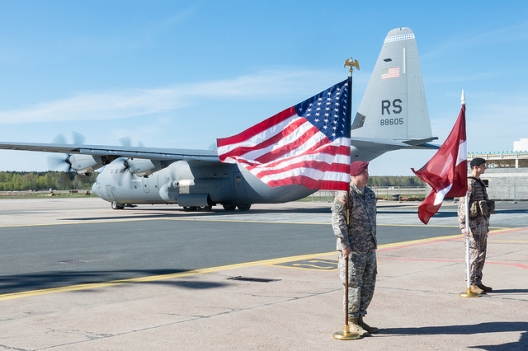 As top Kremlin officials have sounded ominous new warnings that they will defend ethnic Russians wherever they live, Latvia, the NATO nation with the highest proportion of Russians, is feeling like it is in the crosshairs.
As top Kremlin officials have sounded ominous new warnings that they will defend ethnic Russians wherever they live, Latvia, the NATO nation with the highest proportion of Russians, is feeling like it is in the crosshairs.
Six months into a bloody conflict in Ukraine, where pro-Russian insurgents have seized key stretches of territory, other nations that were once part of the Soviet Union are worried they could be the next target of Russian intrigue. President Obama this month vowed that the United States would defend its eastern European NATO allies, but several episodes in recent weeks have tested that resolve.
A top Russian diplomat touched down in Latvia’s capital to warn of “unfortunate consequences” stemming from alleged discrimination against the ethnic Russian minority there. The capital city’s mayor paid an unusually timed visit to Moscow. And a Russian-speakers’ political party passed out fliers comparing a heavily Russian region of Latvia to the Crimean Peninsula, which Russia seized from Ukraine in March in the name of protecting its compatriots.
The incidents have troubled Latvia, a nation of 2 million people along the Baltic Sea, where many retired Soviet officers remained along with their families after the 1991 breakup of the Soviet Union. Because Latvia is a member of the NATO defense alliance, threats against it have importance out of proportion to its size. NATO troops, including a 600-strong contingent of Americans, are rotating through Baltic territories, and NATO leaders this month approved new forces that would be able to quickly deploy to Eastern Europe should they be needed.
“Russia and Putin still have a geopolitical interest in the post-Soviet territories,” said Latvian Defense Minister Raimonds Vejonis. “Russia is trying to use the Russian-speaking minority as a tool to aggressively promote its objectives. . . .
“About one-third of the population uses Russian as its primary language, and 13 percent of the population holds non-citizen status and cannot vote. Latvia’s government temporarily banned some Russian state-run television channels earlier this year, saying that the stations’ coverage of events in Ukraine and in Latvia was detrimental to national security.
“We can see attempts by Russia to affect many countries’ policies. Soft power, soft influence,” said Latvian Foreign Minister Edgars Rinkevics. “Security, foreign policy is back on the agenda, almost as it was in the 1990s.”
Leaders worry that Latvia will be specially targeted ahead of its six-month term holding the rotating E.U. presidency, which begins in January, and they say they are bolstering their defenses against cyberattacks. . . .
“We all know well the real scope of the problems with human rights and the rule of law that our compatriots encounter in the Baltic states. This topic is constantly at the center of attention and activity of the Foreign Ministry of the Russian Federation,” Konstantin Dolgov, the Russian Foreign Ministry’s special representative for human rights, said at a conference this month in Riga for ethnic Russians in the Baltics. “It is necessary to recognize clearly that such actions, carried out by many political forces, can have far-reaching, unfortunate consequences. . . .
“[Riga Mayor Nils] Usakovs’s ethnic Russian Harmony Center party is the largest in Latvia’s parliament, holding nearly a third of the seats. But it has been shut out of ruling coalitions because ethnic Latvian parties have been cautious about accepting a Russian presence at the nation’s top levels.
Image: Arrival of US 173rd Infantry Brigade troops in Latvia, April 24, 2014 (photo: Department of State)
